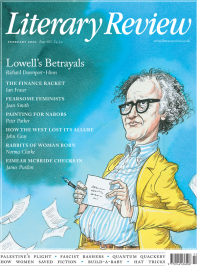Robert Mayhew
Play It Again, Vlad
The Lost Pianos of Siberia
By Sophy Roberts
Doubleday 433pp £18.99
At the opening ceremony of the 2012 Olympics, Mr Bean famously played a single note repeatedly on an electric keyboard, to the staged fury of the conductor Sir Simon Rattle. Scroll forward two years to the closing ceremony of the 2014 Winter Olympics in Sochi and you encounter a rather different attempt to capture national character through the piano. On that occasion a piano emerged from beneath the stage amid smoke and fireworks, and Denis Matsuev delivered a virtuosic performance of Rachmaninov’s Second Piano Concerto. Audiences went wild at both events, but for very different reasons. From Dudley Moore to Rowan Atkinson via Eric Morecambe, the British have poked fun at the perceived pomposity of pianists. Russians, on the other hand, have treasured pianists, from Emil Gilels and Sviatoslav Richter to Evgeny Kissin and Matsuev, and set them at the heart of their national identity. Showing no mean ambition, Sophy Roberts’s intriguing, engaging and thought-provoking travelogue The Lost Pianos of Siberia seeks to open up Russian musical devotion for an English-speaking audience.
There’s a confessedly quixotic element to Roberts’s quest for pianos in the furthest recesses of Siberia. She is not a pianist or even a musician, but the idea of searching for these most civilised of objects in far-flung locations gripped her imagination. At times, Roberts draws parallels between her own ambitions and those of a colonial traveller looking to ‘bag’ rare finds: early on she gives an account of sighting a Siberian tiger and expresses the hope that this will bring her good luck on her musical quest. While travelling through the often impoverished remains of the Soviet Union, Roberts is enabled by her (comparative) wealth to seek out and, in the end, to buy a rare old piano for a friend.
Overall, what shines through in this book is Roberts’s genuine, humane affection for and fascination with the people she meets in Siberia. We get almost as few sightings of pianos as of Siberian tigers. This is most definitely not an account of a heroic quest to uncover Bechsteins in out-of-the-way

Sign Up to our newsletter
Receive free articles, highlights from the archive, news, details of prizes, and much more.@Lit_Review
Follow Literary Review on Twitter
Twitter Feed
It wasn’t until 1825 that Pepys’s diary became available for the first time. How it was eventually decrypted and published is a story of subterfuge and duplicity.
Kate Loveman tells the tale.
Kate Loveman - Publishing Pepys
Kate Loveman: Publishing Pepys
literaryreview.co.uk
Arthur Christopher Benson was a pillar of the Edwardian establishment. He was supremely well connected. As his newly published diaries reveal, he was also riotously indiscreet.
Piers Brendon compares Benson’s journals to others from the 20th century.
Piers Brendon - Land of Dopes & Tories
Piers Brendon: Land of Dopes & Tories - The Benson Diaries: Selections from the Diary of Arthur Christopher Benson by Eamon Duffy & Ronald Hyam (edd)
literaryreview.co.uk
Of the siblings Gwen and Augustus John, it is Augustus who has commanded most attention from collectors and connoisseurs.
Was he really the finer artist, asks Tanya Harrod, or is it time Gwen emerged from her brother’s shadow?
Tanya Harrod - Cut from the Same Canvas
Tanya Harrod: Cut from the Same Canvas - Artists, Siblings, Visionaries: The Lives and Loves of Gwen and Augustus John by Judith Mackrell
literaryreview.co.uk